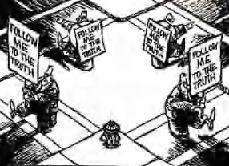07/ 08/ 2006

Many people introduce themselves in categorized or labeled ways. Some might do so by describing
themselves as a "Southerner" or a "Yankee" or politically as a Conservative or Liberal. (Since I live in Washington State,
my sister calls me a "tree-hugging, mocha-snarfing Northwesterner.")
The primary spiritual foundation as Christians is a "walk" in the Master's Path or, as my daughter
has expressed it "my walk with Jesus."
Yet the very diversity of Christian churches and the diversity even of congregations within
national church organizations demonstrate just how fully that spiritual stepping is a matter of private interpretation.
The conformity of doctrine, dogma and evangelized exhortation as to what those doctrines and
dogma really mean are deceptive. Despite what looks like a commonality in meaning - for example the concept of being "born
again" - that commonality does not exist except perhaps in the minds of those most prominent on the religious landscape.
A personal walk in the Master's Path is based on personal perception of how the Master viewed
life and life's questions. The notion that you are not walking that path if someone prominent or someone personally important
to you disagrees with your definitions is, as I have said many times before, borrowing someone else's magic.
The way in
which Jesus' path is followed reflects permanent or tentative internalized assumptions about Jesus ...
and the following questions:
Where did I come from?
Beyond the Biblical references to a pre-existent life with God where the sons of God shouted
for joy, how did Jesus' answer that question?
Those who believe Jesus was 100% God and 100% human then find themselves in a circumstance of
attempting to emulate someone who in reality remains an impossible pattern to follow - because he had the BIG advantage being
the "Boss's Son."
There are those who are more able to relate to the mortal Jesus' by placing greater emphasis
on that mortality as a pattern of behavior and making choices.
"What would Jesus do?" is only a legitimate self-question if asked in the
understanding that whatever Jesus would do is something we are capable of doing.
What we do know is that Jesus taught that we are the sons and daughters of God more so than
He ever taught that "I am uniquely the Son of God"in a way that makes his life an impossible pattern. Life
is not an impossible pattern and one principle cornerstone of His teaching is in fact a very personal relationship with God
- unfettered by someone else's magic, interference or need to be a go-between.
That relationship, that constant communion with God identical to the relationship Jesus demonstrated
is ours to possess.
Why is there evil in the world?
In his life we read many instances of Jesus addressing and confronting evil. I do not think
that He ever intended that the answer to why evil exists be a secret or hidden doctrine.
A walk in the Master's Path includes the need to discern the answer as to why evil exists, how
it is to be discerned and in what form a response should be made. We do know that Jesus did not define nor prescribe responses
to perceived evil by quoting or declaring verses from the Old Testament. Rather, in many instances, Jesus overrode those verses
with more personally empowering suggestions.
Rejecting someone else's magic, we are left with Jesus' words as a very direct "how to know"
rather than precisely "what to do."
What happens to me when I die?
Despite the interpolations and historical self-serving assertions of priesthood authorities,
Jesus did not walk around threatening people with hell as a consequence of failure to conform.
"Repent for the kingdom is at hand" does not nor did it ever mean "do things
my way or you'll burn in hell."
If it did, then Jesus would have not spoken to Nicodemus in such a metaphorical manner,
nor told his disciples to "Feed my sheep" when "govern my lambs and don't let them out of your sight"
would more accurately reflect "do it my way or else."
Jesus literally walked into death unafraid - because He had knowledge of reality that went beyond
mortal fear of the unknown as well as an understanding of eternal life and how the kingdom of God exists within us.
Believers in an inerrant and absolute Bible in their letter-of-the-law seem to forget this -
especially when they attempt to capitalize on a fear of death and judgment when pushing conformity.
Jesus' knowledge of reality that went beyond mortal tendencies to fear death and the unknown
was in reality the heart of his teachings. Otherwise, lilies of the field had no business in his repertoire since they don't
seem to worry about conformity and group think.
A walk in the Master's Path includes the ability to comprehend and internalize what the Master
knew. Otherwise He would not have discussed it openly. His mission and teaching of his disciples would have included secret
or esoteric initiation into higher and more profound truths based on conformity and completion of elaborate probationary activities
designed to merit further light and knowledge.
His path was simple, confident, and compassionate and based on inculcating a desire in others
for the highest good of all concerned. For that reason, a Walk in the Master's Path must include a clearly obtained and definable
understanding of what Jesus meant about the kingdom of God being within rather than a place in the future.
What is taboo and what is to be avoided?
A Walk in the Master's Path is the result of having defined what is taboo and what to avoid.
The examples from Jesus' path - especially as it conflicts with contemporary judgmental mores - forces us to deal with those
questions on a very intimate and personal level.
Who did Jesus' shun? With whom did Jesus socialize and what were the consequences of that activity?
That very segment that took issue with Jesus' social habits included those whom he criticized most directly.
"Sinners" was a word Jesus ended up throwing back in the faces of those who professed most to
know who and what sinners were. Judgment and execution of penalty was precisely what Jesus refused to do with those among
whom He preached the most. The accusers, the judgers and those who would execute were the societal segment He opposed most
directly.
He walked and talked and blessed and healed the most outcast, persecuted and exploited members
of society; the lepers, the poor, the tax collectors, prostitutes, the demon-possessed and the zealots hungering for revolt
- the entire spectrum of what the hypocritical "righteous" considered dangerous or unclean. For this he did not catch leprosy,
did not fall into a psychologically destitute poverty, did not become a tax collector nor prostitute himself, become demon-possessed
nor join in political revolution.
Does that Path not suggest that we could do the same without soiling ourselves?
Who are the heroes, villains, enemies and allies?
The Master did not pay homage to the celebrities, the high priesthood officials, the Romans
nor their army, nor the scholarly scribes and their supposedly superior scriptural knowledge.
Instead he celebrated the common people, fisherman, laborers, widows, and people with flaws
who acknowledged their sins, the humble, the merciful, the meek and especially the compassionate.
The villains to Jesus were the priesthood of whited sepulchers, the priesthood that robbed and
extorted the masses in the name of God, the rulers driven by greed, selfishness, and greater evils of deception, cruelty and
hypocrisy.
What is disease and how can I be healed?
The Master's Path revealed a consistent pattern of the need to - as much as possible - heal
one's self. For as many as were healed at Jesus' direction, more were healed by Jesus' empowerment of their lives. Jesus demonstrated
that faith is not some exceeding belief intensified to a point of satisfying God who then heals.
He proved that illness begins in the heart and mind - not as a function of sin and unworthiness
thereby resulting in a curse from God - but as a function of knowing and understanding the linkage between body and spirit;
between the spirit and God. That is what generates faith unto healing that is not limited to withered hands, physical blindness,
or leprosy.
hat should we do with bounty and surplus?
The Path of the Master did not reflect the idea that bounty and surplus should be hoarded, hidden
away nor become the property of an elite few. Rather, the spirit of God is the spirit of generosity, an eye single to the
glory of God which in fact is the highest good of all concerned and - again - compassion.
Jesus did not glorify economic prosperity as evidence of personal righteousness and would have
repudiated so-called "Prosperity Theology." Among the signs that would follow those who believe, personal wealth - though
not something evil - was not one of the promised blessings from the hand of God.
What we do with bounty and surplus in the presence of those who are needy is one aspect of godliness
that we have available to exercise every day. It is more important than sermonizing, moralizing, politicizing morality, agitating
for laws enforcing righteousness as well as isolating, shunning or punishing those we pretend are not as worthy of God's love
as we are.
What is our relationship with nature and the animals?
The Master's Path acknowledged the compassion of God in the life of every living thing - even
sparrows. He left us no declaration or inference that available land and animal resources are to be exploited to their fullest
and to destruction.
Had He done so, early Christians would have commenced earning a 2000-year-old reputation as
land developers, a culture that plowed under lilies of the field to dig mines, and a culture that placed no value on animals
other than for rendering and selling.
Had Jesus taught the currently popular dominionist doctrine, with exploitation disguised as
"dominion" by the start of the 21st century, Christians would have by now deforested a continent in the name of God, and depopulated
and rendered extinct or near-extinct many more species than passenger pigeons and buffalo.
But He did not do that. A Walk in the Master's Path means that the spiritually independent have
addressed this question and found a satisfactory answer.
Spiritual independence is Jesus' holiest prescription for a real relationship with God. It is
based on fierce independence of self that leads to seeking to know and understand God as Jesus Himself knew and understood
God.
He did not need outside help, monitoring or control by anyone else in authority.
This is in fact the Christ Path.
Jesus' life was an example of how mortals should live - not "Do what I say!"
but "Do what I do."
Everything about the Master's Path, everything we can perceive and conceive about Jesus' life
is ours to discover.
As He advised: search the scriptures (but search without outside interference),
ask and it shall be given (no need to ask a middleman with the expectation
that the middleman will make arrangements with God for you),
seek and ye shall find what you seek (not something approved by a middleman
as worthily seekable),
knock and it shall be opened unto you (not a door opened where you cannot
enter unless the middleman is there to whisper a secret key in your ear or confirm your righteousness and conformity before
God.)
This kind goes not out but by prayer and fasting," He said.
Your prayer ... Your fasting ... Your seeking ... Your asking ... Your knocking ...
You decide how to Walk the Master's Path
The Kingdom of God is in your life right now.
You have to discover it on your own sincerity.
No one else has authority nor influence over it.
© Arthur Ruger 2006

